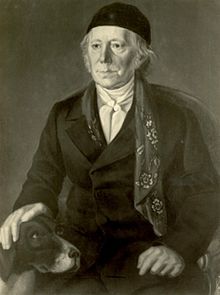Johann Caspar Harkort V.
Johann Caspar Harkort (V.) (born June 19, 1785 Harkorten (today Westerbauer ) near Hagen in Westphalia; † August 16, 1877 Harkorten house there ) was a German entrepreneur .
family
He was the son of the father of the same name Johann Caspar (IV.) And the mother Henriette Catharina Harkort born. Elbers. Among other things, he was a brother of Friedrich , Eduard and Gustav Harkort . He himself married Johanna Friederike Ihne. The eldest son Johann Caspar (VI.) Emerged from the marriage.
Life
As the eldest son, after the death of his father in 1818, he took over the family's ancestral home and continued to transform the trading house into an industrially oriented company. The trading house primarily sold the products of the Brandenburg hardware industry. Harkort stepped up the production of products made in blacksmiths and hammer mills, foundries and metallurgical plants. He converted the Harkort factory into a company for the manufacture of accessories for the railways and, since 1840, for the construction of iron bridges. Harkort was involved in a consortium to found Hasper Hütte in 1849 .
In recognition of his achievements, he was appointed to the Council of Commerce in 1847 . He never held this title out of modesty. Since 1845 he was a deputy member of the Westphalian provincial parliament . Johann Caspar Harkort V. was instrumental in founding the Hagen Chamber of Commerce in 1844 and became its first president. At times he was also head of the community of Westerbauer . As early as 1857 he left the management of the family business to his eldest son.
Role in the revolution of 1848/49
During the revolution of 1848/49 he was chairman of the Constitutional Association in the Enneperstraße office with its seat in Haspe . As early as April 1848 he publicly opposed a planned democratic newspaper. He also started a journalistic debate with Carl Post about the ways and goals of a transformation of Germany. Post took democratic positions. Harkort also advocated liberal goals such as parliaments instead of assemblies of estates, freedom of expression, an independent judiciary and an end to noble privileges. But those were secondary goals for him. More important were the stability of the circumstances and security for one's own civil and economic existence. A considerable part of the Brandenburg economic bourgeoisie was more on the side of the Harkort brothers than on those in favor of strong restructuring. Against this background, Harkort pleaded for lists of potentially dangerous people to be drawn up and their individual freedom to be restricted by bans going out at night. Like his brother Friedrich, he pleaded for a gradual improvement in the social situation of workers through education.
In connection with the imperial constitution campaign , which developed into an open uprising in neighboring Iserlohn , Johann Caspar Harkort V traveled to Berlin as part of a delegation for the Office of Hagen to present the wishes of the residents of the County of Mark to the king . He assured the Crown Prince that not all Markaner were the "worst democrats".
literature
- Stefan Gorißen: From trading house to company. Social history of the Harkort company in the age of proto-industry (1720-1820). Göttingen 2002, v. a. P. 138.
- Ralf Stremmel: Economic bourgeoisie in the revolution of 1848/49. The conditions in the Brandenburg region. In: Wilfried Reininghaus (ed.): The revolution of 1848/49 in Westphalia and Lippe. Münster 1999, v. a. P. 378.
Individual evidence
- ^ Friedrich Zunkel: The Rhenish-Westphalian Entrepreneurs 1834–1879. A contribution to the history of the German bourgeoisie in the 19th century. Wiesbaden 1962, p. 124.
- ^ From the commemorative publication for the 250th anniversary of the Johann Caspar Harkort company on January 17, 1924
- ^ Wilfried Reininghaus: The districts of Dortmund and Hagen 1848/49. In: Wilfried Reininghaus (ed.): The revolution of 1848/49 in Westphalia and Lippe. Münster 1999, p. 237.
- ^ Ralf Stremmel: Economic bourgeoisie in the revolution of 1848/49. The conditions in the Brandenburg region. In: Wilfried Reininghaus (ed.): The revolution of 1848/49 in Westphalia and Lippe. Münster 1999, pp. 386-390.
- ^ Wilfried Reininghaus: The districts of Dortmund and Hagen 1848/49. In: Wilfried Reininghaus (ed.): The revolution of 1848/49 in Westphalia and Lippe. Münster 1999, p. 240.
- ^ Wilfried Reininghaus: The districts of Dortmund and Hagen 1848/49. In: Wilfried Reininghaus (ed.): The revolution of 1848/49 in Westphalia and Lippe. Münster 1999, p. 243.
| personal data | |
|---|---|
| SURNAME | Harkort, Johann Caspar V. |
| BRIEF DESCRIPTION | German entrepreneur |
| DATE OF BIRTH | June 19, 1785 |
| PLACE OF BIRTH | Harkorten |
| DATE OF DEATH | August 16, 1877 |
| Place of death | Westerbauer |
